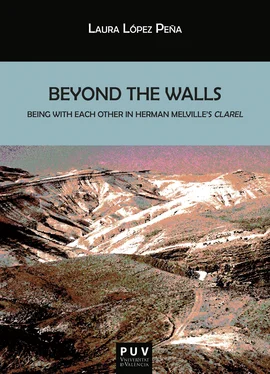By rejecting any form of institutionalized religion and dogma, Melville seems to suggest that the fraternal love and forbearance promoted—yet sometimes not practiced—by religious institutions need to emerge from individuals, within themselves lying the potentiality of being at peace (or at war) with the world and with themselves in an Ishmael-Queequeg-like way. This moves closer to a secular rather than religious view of morality that is based on the fact of being, conceived not only as our own individual lives but also as our existence in the world, and therefore our being- with others. As early as in April 1851, Melville would write to Hawthorne: “As soon as you say Me, a God, a Nature , so soon you jump off from your stool and hang from the beam. Yes, that word is the hangman”, adding that God should be taken out of the dictionary in order to be present in the street ( Correspondence 186). Alfred Kazin has noted that “[w]hat he [Melville] finally come [sic] out with is that God is not a single entity to be taken seriously. It is not in ‘God’ that we are immersed, but being , the actual flux and storm. We kill ourselves when we try to turn ‘God’ from a word into an absolute separate power and then try to figure Him out” (255). It is in line with this secular conception of being and ethics that the present volume interprets Melville’s universalist project in Clarel , where the author would moreover expose a bleaker awareness of the difficulties, even impossibility, of individuals to develop such potentiality and be at peace with themselves and others.
1 The use of the term “mankind” at this point is intended to reflect the sexism in Kant’s thinking, which, together with the philosopher’s racism, permeates his cosmopolitan theorizations.
2 In her volume Melville’s Art of Democracy (1995), Nancy Fredricks acknowledges that there is no record of Melville’s having read Kant’s philosophical works. However, she notes that Melville was familiar with Kant’s thinking, as proved by six references to Kant in Melville’s novels Mardi (1849), Moby-Dick (1851), and Pierre (1852), and by the fact that the author seems to have engaged in discussions of Kant and orther German philosophers with German scholar George Adler during his 1849 trip to England (Fredricks 14). Fredricks analyzes these six references and discussion with Adler in the chapter “Melville’s Kant”, in her volume.
3 It is possible to interpret these texts as dedications to the characters that are drawn in the narratives and which, very often, the very titles to these pieces already honor.
4 Regarding Clarel , it is important to highlight, for example, Stan Goldman’s (1993) study of the poem as exemplifying what the scholar terms Melville’s “Protest Theism”, and William Potter’s (2004) analysis of Clarel , from the perspective of comparative religion, as an exercise in what Potter calls “intersympathy of creeds”. Complementing Potter’s analysis, moreover, Basem Ra’ad has claimed that “Melville engaged in something more profound than making ‘comparative’ points: he systematically explored various mythological systems, including the beliefs of Judaism and Christianity” (“Ancient” 138), among others. I agree with Ra’ad’s remark, and believe that Melville’s life-long exploration of religion was always enriched by his critical approach.
5 Some of these works include, among others, William Braswell’s Melville’s Religious Thought: An Essay in Interpretation (1943), Natalia Wright’s Melville’s Use of the Bible (1949), Lawrance Thompson’s Melville’s Quarrel with God (1952), Bruce Franklin’s In the Wake of the God’s: Melville’s Mythology (1963), T. Walter Herbert’s Moby-Dick and Calvinism: A World Dismantled (1977), James Duban’s Melville’s Major Fiction: Politics, Theology, and Imagination (1983), Stan Goldman’s Melville’s Protest Theism (1993), Walter Donald Kring’s Melville’s Religious Journey (1997), Peter Stallybrass’s “Books and Scrolls: Navigating the Bible” (2002), Gail Coffler’s Melville’s Allusions to Religion (2004), and Ilana Pardes’s Melville’s Bibles (2008).
6 William Potter has explained that Melville and Lizzie together belonged consecutively to two Unitarian Churches in New York at different moments of their lives, the Church of the Divine Unity, before moving to Pittsfield in 1850, and All Souls’ Church, after returning from Pittsfield in 1863 (205).
Конец ознакомительного фрагмента.
Текст предоставлен ООО «ЛитРес».
Прочитайте эту книгу целиком, купив полную легальную версию на ЛитРес.
Безопасно оплатить книгу можно банковской картой Visa, MasterCard, Maestro, со счета мобильного телефона, с платежного терминала, в салоне МТС или Связной, через PayPal, WebMoney, Яндекс.Деньги, QIWI Кошелек, бонусными картами или другим удобным Вам способом.










